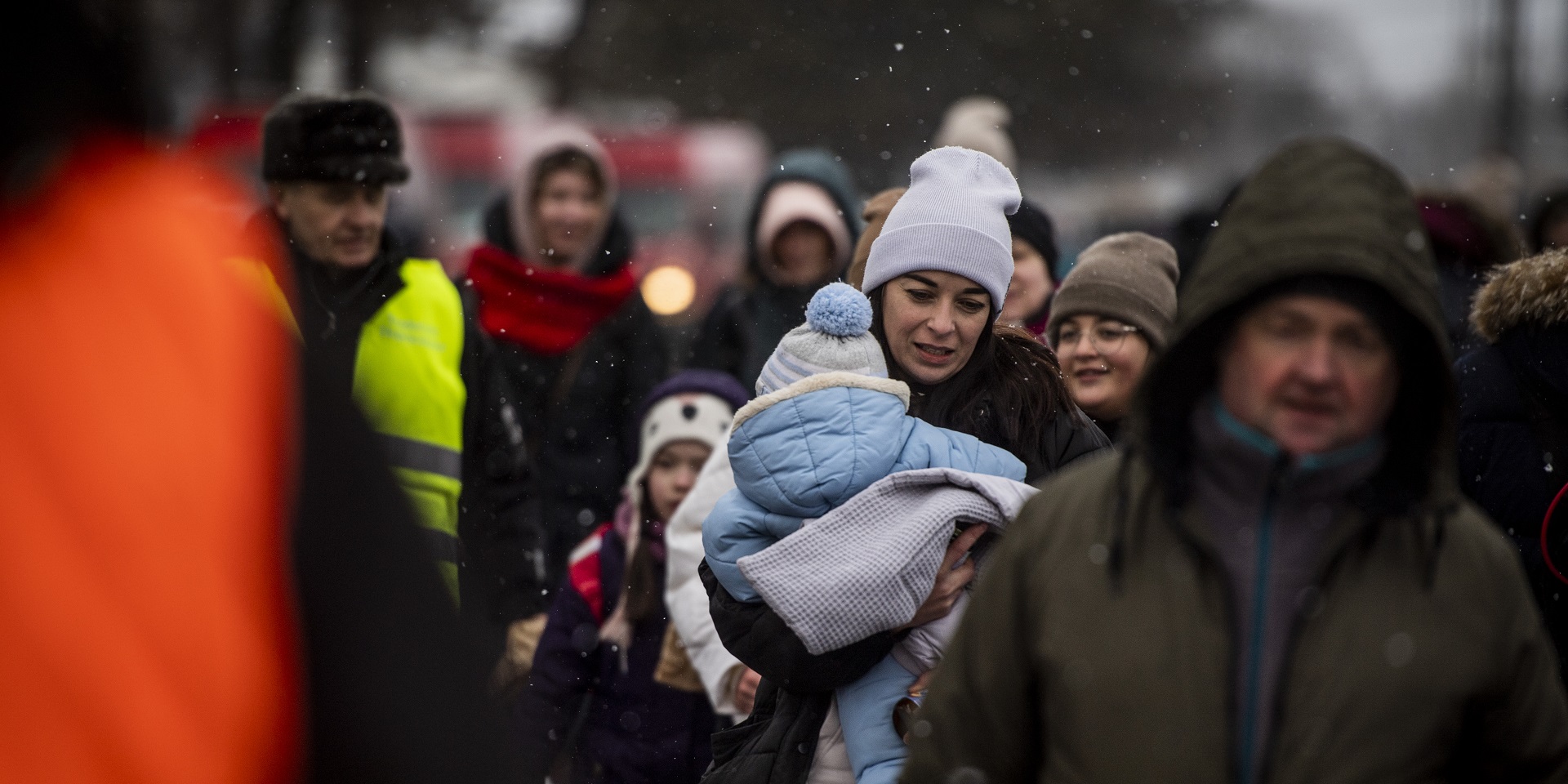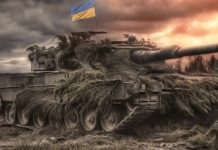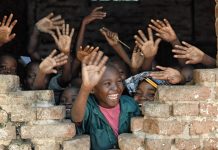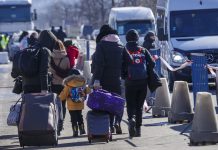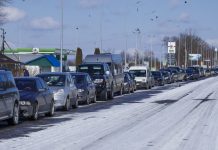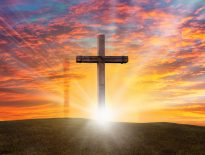On February 27, 2022, I exchanged my pastor’s suit and tie for an ADRA volunteer vest at the Siret Customs point on the Romanian border.
It was a spontaneous, emotional decision. I left my wife and 4-year-old child at home in Brașov. I called one of my best friends, Lilian, who also speaks Russian, to dive together into a crowd of war-fleeing people. They were struggling to find a place under the open sky in Romania.
I learned Russian as a child, on the playground, among the children in my neighbourhood. There was the sandpit of the nations, including Moldavians, Russians, Ukrainians, etc. There I also learned that there are no differences in skin colour between children, no superior or inferior nations, no good or bad countries. There was peace and things were good!
I never thought that I would use my knowledge of Russian in the context of a war. Now the time had come. The war has shown once again that it can periodically generate a new kind of world citizen: the refugee. Refugees are forced to accept a confusing reality, where there is no home, country, and often, no hope. Once at the Siret customs, I was struck by the image of thousands of refugees crossing the border.
Rows of people and cars were flowing into Romania. There we found the little Dasha, Anya, Nikolai, Nastya, Elena, Nikita, and their mothers and grandmothers, Iana, Katerina, Tatiana, Liudmila and Zlata exhausted from the long road. The image of mothers with four- or five-month-old babies in their arms got me thinking of Michelangelo’s Pietà. A mother will do anything to save her child from the madness of war.
I had come to the border as a translator, and I started out well. I helped several refugees in the early hours, but very soon I realised that I had to do more than that. Initially, I was stuck in technical communications, which addressed the immediate problems of the refugees: food orientation, transportation, and accommodation. Gradually I realised that these were secondary needs.
Most of their tears were symptoms of a much deeper emotional need. Martial law in the neighbouring country had led to the separation of wives, mothers with children and grandmothers from husbands, fathers, and grandfathers who could not cross the border. The picture was devastating. Their fears culminated in a loud thought, “We don’t know if we’ll ever see them again!” Each of them had a story to tell.
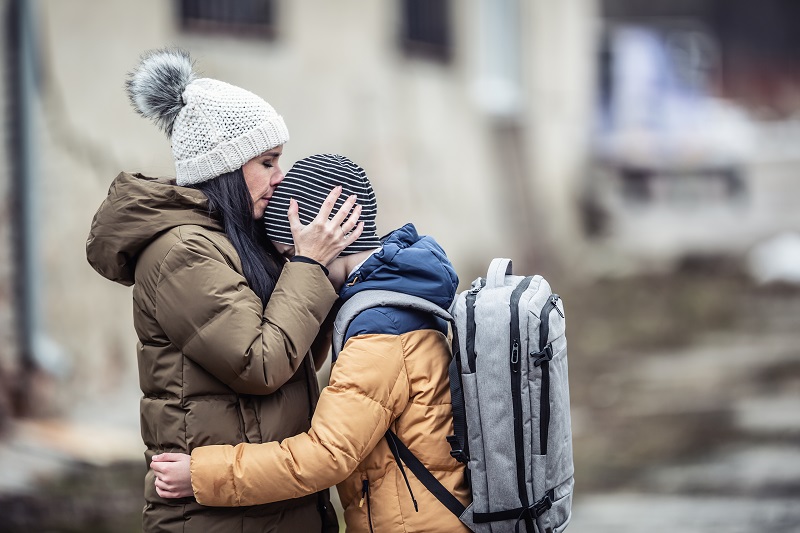
This image made me change my approach. I gradually came to understand that we were not just translators of words and phrases, we were translating emotions and feelings. Our vocation had extended to counselling these orphans of the world. I took warm words of welcome and reassurance from my bag, assuring them that they had arrived in a safe and secure place. I told them that Romania is a friendly place for them.
The despair they went through had to be dispelled with a lot of empathy and natural compassion. A hot tea together with a kind word and a warm smile had unexpected emotional effects for them, but also for us. In such a context, a friendly look, a hug, and a helping hand would be the beginning of the therapy against despair.
Mitigation of suffering had become a priority. The shock of the armed conflict had to be alleviated by delicate communication, positive, friendly, and warm emotions. The level of distrust among refugees was high. But in the absence of other solutions, they left themselves in the hands of the friendly volunteers. Sometimes too friendly, too insistent, too benevolent. I sometimes had the impression that some volunteers would “suffocate” the refugees they were supposed to care for. Empathy has its excesses too.
Almost every refugee family was impressed by the extraordinary hospitality at the Romanian customs. In addition to tears of parting from loved ones, I also saw tears of joy when they discovered that the volunteers received them with open arms.
The deployment of humanitarian forces was reaching its peak in the valley of the Siret River. The Ukrainians asked me in amazement: “Are all these people and all these things brought here for us?” Everything was unlikely for them.
These were hot days in the light of events, but with low temperatures. Cold and unfriendly weather for those waiting to cross the border, but also for the tireless volunteers. I found out that on the Ukrainian side there was a long queue of cars, but also people who had set out to cross the border on foot. On one of the brighter days, I was approached by Andrei from Piatra Neamţ, who was looking for a translator. He wanted to cross the border in order to provide the necessary help to those affected by the cold outside.
The next day, three of us volunteering left in a car. We crossed the border and arrived in Ukraine. We discovered the line of people without means of transport and a queue of about 5-6 kilometres of cars waiting to cross the border. On this side of the border the tension and impatience with which thousands of people waited to catch the green light towards safety was obvious.
At one point, in our contact with the refugees, Andrei discovered that I was a pastor and said with a smile, “The three of us found ourselves here—a believer, an unbeliever, and a Jew!” I later discovered that Andrei Rădulescu is a film producer and director, and Gal is a Jew from Berlin, who runs an NGO called IsraAID Germany. I appreciated them for their courage and involvement. Since the beginning of the war, the two have organised several transports with humanitarian aid to Ukraine. I was thinking I liked their “religion” which motivated them to help those in need.
It is clear that I had inevitably become Ukrainian. In fact, during this period, the world changed our planet’s name into Ukraine. Because Ukraine these days is no longer a country, it is no longer a geographical territory or a people. Today’s Ukraine has become a symbol, an experience, a cause, a fragment of our lives, a philosophy of resistance of good against evil, an act of brotherhood between people of different cultures and values.
And there’s something else. War is absurd, there’s no question about it. But war stirs up and awakens something latent in the human being: the ability to love and serve unconditionally. It is a strange but very real conditioning of the manifestation of love.
If I could paint a picture of paradise on earth, then my mind would surely run to the landscape of the Siret Customs.
In that place I found heaven, which was externalised by the unconditional service offered to those fleeing the war. There I saw how all the dividing lines, all the ideological and ethnic boundaries had disappeared. All the resentment and hatred that man has ever been capable of had been dispelled before the supreme vocation: save your neighbour! In the vicinity of the war-torn hell, one can see with the naked eye how a heaven of service can be built.
Now I sit by the stove, where it’s warm, and think about the experience of the days spent at the border, in the cold light of reason. I have not had the opportunity to see war, but I saw two of its consequences: pain and suffering against service and love. The two evoke two antagonistic states in my soul, but I am forced to seek balance. Therefore, among the contradictory consequences and conditions, I will choose hope! Although exhausted by belligerent situations, mankind still has hope.
The satisfaction of seeing the smiles of the refugees among the tears reminded me of the words of the prophet Jeremiah to Baruch: “…but wherever you go I will let you escape with your life” (Jeremiah 45:5). After all, in the absurdity of passing events, we find that life is an inexpressible gift. If we forget this gift, history takes care to remind us of it. I leave you with these words that I uttered at the first contact with those seeking refuge on the Romanian land of peace: Ne perejivaite, vseo budet horoșo! S Bogom![1]
Mihai Miron is the pastor and director of the Department of Religious Freedom of the Adventist Church in Southern Transylvania.












